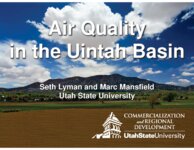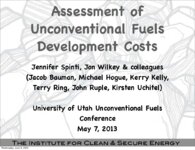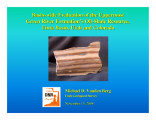TO
Filters: Collection: "ir_eua" Subject: "Utah"
| Title | Date | Subject | Description | ||
|---|---|---|---|---|---|
| 1 |
 |
A brief history of early mineral exploitation in the Uinta Basin | 1964 | Uinta Basin; Mining; Uintah Valley; Indian Reservation; Meeker; Utah; History of early mineral exploitation; Uintah Reservation; Gilsonite; Coal; Copper; Iron; Oil shale; Ozocerite; Wurtzilite; Oil; Asphalt; Ashley Creek; Hatchtown; Vernal; Fort Duchesne; Ouray Subagency | Early mining activities in the Uinta Basin can be summarized by saying that they included mining for gilsonite, coal, copper, iron, oil shale, ozocerite, wurtzilite, and oil and asphalt (under the placer mining laws). Of these minerals only coal and gilsonite were produced in commercially significan... |
| 2 |
 |
A comparison of biomakers in gilsonite, oil shale, tar sand and petroleum from Threemile Canyon and adjacent areas in the Uinta Basin, Utah | 1992 | Gilsonite; Oil shale; Tar sand; Petroleum; Threemile Canyon; Uinta Basin; Utah; Green River; Hopane; Sterane; Carotenoid biomarkers; Alginite; GC/MS; Ion fragmentograms; Biodegradation; Maturation; Oil shale outcrops; Bluebell-Altamont; Red Wash field; Bitumen; Pyrolysis; Py-GC/MS; Curie-point pyrol... | Relationships between gilsonite, oil shale and petroleum were investigated by comparison of hopane, sterane and carotenoid biomarkers. Samples examined were alginite, gilsonite, oil shale, tar sand and petroleum. Comparison of peak distributions in specific GC/MS ion fragmentograms of the above hydr... |
| 3 |
 |
A model of hydrocarbon generation from type 1 kerogen: Application to the Uinta Basin, Utah | 1986-12-18 | Pyrolysis; Green River shale; Petroleum; Utah; Uinta Basin; Kerogen; Oil; Eocene; Type I kerogen; Hydrocarbon generation; Oil generation; Gas generation; Kinetics | The Uinta Basin in northeastern Utah provides an ideal setting to study the evolution of kerogen to petroleum. Oil shale rocks of the Eocene-age Green River Formation outcrop extensively at the southern edge of the synclinal basin. The same rocks are also found at depths of 3650 m in the deepest par... |
| 4 |
 |
A proposal to evaluate oil-impregnated sandstone in the Uinta Basin, northeast Utah; made to the Energy Research and Development Administration by Utah Geological and Mineral Survey | 1976-06-15 | Petroleum; Utah; Uinta Basin; Oil; Bitumen; Ore waste radiation; Oil-impregnated sandstone; Deposits | Most of the known petroleum resources in the form of oil-impregnated in the United States occur in Utah. It is estimated that over ten billion barrels of petroleum occur in such deposits in the Uinta Basin alone (Ritzma, 1973; Campbell, 1975). Four deposits among the twenty identified in the Uinta ... |
| 5 |
 |
A reconnaissance evaluation of heavy hydrocarbons in the Tar Sand Triangle | 1985-08 | Utah; Tar Sand Triangle; Permian White Rim Sandstone; Moenkopi Formation; Cedar Mesa Sandstone; Chinle Formation; Oil; Oil-impregnated sandstone deposit; In-situ; Heavy hydrocarbons; Triassic; Jurassic Navajo Sandstone | The Tar Sand Triangle encompasses about 200 square miles in southeastern Utah. The area consists of rough, mountainous terrain, with a climate that varies from semiarid to arid. Sedimentary rocks exposed in the area range from Permian Cedar Mesa Sandstone to the Triassic(?)-Jurassic Navajo Sandstone... |
| 6 |
 |
Air quality in the Uintah Basin | 2013-05-07 | ICSE; Unconventional fuels; Air quality; Air pollution; Uintah Basin; Ozone; Pollutant concentrations; Inversions; VOC; Utah | Presentation given at the University of Utah Unconventional Fuels Conference, Salt Lake City, Utah, May 7, 2013. |
| 7 |
 |
An assessment of oil shale and tar sand development in the state of Utah: Phase 1 | 1980-05 | Oil shale; Tar sand; Utah; Synthetic fuels; Tar sand development; Tar sand deposits | This assessment is the result of an interest and commitment by the State of Utah to both promote development of its vast energy resources and to manage the impacts associated with such development. As the development of Utah oil shale and tar sands became more imminent a specific proposal to study t... |
| 8 |
 |
An assessment of oil shale and tar sand development in the state of Utah: Phase 2--policy analysis | 1982 | Oil shale; Tar sand development; Utah; Synthetic fuels; Uintah Basin; Northeastern Utah; Petroleum reserves; Tar sand; Oil; Synthetic Fuel commercialization viability | The potential development of synthetic fuels in the United States has been characterized by a great variation in preceived economies. The interest has been on an upswing during the decade of the 1970's due to the possibility of synthetic fuels lessening U.S. dependence on foreign oil. However, even ... |
| 9 |
 |
APPENDIX A - Analysis of environmental, legal, socioeconomic and policy issues critical to the development of commercial oil shale leasing on the public lands in Colorado, Utah and Wyoming under the mandates of the Energy Policy Act of 2005 - Final Project Report - Reporting period: June 21, 2006 to October 21, 2009 | 2009-10 | Oil shale; Colorado; Utah; Wyoming; Energy Policy Act of 2005; Green River Formation; Environmental; Legal; Socioeconomic; Policy Issues; Oil shale deposits; BLM; Bureau of Land Management | The United States is home to the largest oil shale deposits in the world. This resource is located in the Green River Formation, spreading across the states of Colorado, Utah and Wyoming. Despite the vast potential of this resource, successful commercial development has yet to occur. To date, concer... |
| 10 |
 |
APPENDIX B - Depositional heterogeneity and fluid flow modeling of the oil shale interval of the upper Green River Formation, eastern Uinta Basin, Utah - Final Project Report - Reporting period: June 21, 2006 to October 21, 2009 | 2009-10 | Green River Formation; Uinta Basin; Utah; Uintah County; Oil shale; Deposition | In this project, a detailed geological analysis was performed followed by a reservoir modeling exercise. For the geological analysis, ~300 m of cores were correlated to gamma and density logs in well P4 in the lower to middle Eocene (49.5-48.0 million years ago (Ma)), upper Green River Formation of ... |
| 11 |
 |
APPENDIX C - In-situ production of Utah oil sands - Final Project Report - Reporting period: June 21, 2006 to October 21, 2009 | 2009-10 | Utah; Uinta Basin; Oil sand reservoirs; Whiterocks; Sunnyside; Oil; Oil extraction; In-situ; Heavy oil production; Bitumen | Two oil sand reservoirs located in Utah's Uinta Basin were considered for analysis: Whiterocks, a small, steeply dipping, contained reservoir containing about 100 million barrels, and Sunnyside, a giant reservoir containing over four billion barrels of oil in place. Cyclic steam stimulation, steam a... |
| 12 |
 |
Assay products from Green River oil shale | 1986-02-18 | Pyrolysis stoichiometry; Green River; Oil shale; Oil; Mahogany zone; Colorado; Utah; Pairwise correlation coefficients; Pyrolysis; Elemental analyses of shales and oils; Organic carbon; Gas composition; Elemental composition; Oil shale grade; Raw shale | Data from 66 material-balanced assays conducted at Lawrence Livermore National Laboratory, Laramie Energy Technology Center, and The Oil shale Corporation were compiled and analyzed to determine the pyrolysis stoichiometry for Green River formation oil shales originating in and near the Mahogany zon... |
| 13 |
 |
Assessment of unconventional fuels development costs | 2013-05-07 | ICSE; Unconventional fuels; Development cost; Oil Shale; In situ; Ex situ; Oil Sands; Utah; Uinta Basin | Presentation given at the University of Utah Unconventional Fuels Conference, Salt Lake City, Utah, May 7, 2013. |
| 14 |
 |
Availability of tar sands on public land: An overview | 2006-09-21 | Tar sands; public lands; Utah; Leasing on federal lands; Hydrocarbonaceous material; Oil shale; Tar sand development | Presentation summary: 1-Provide an overview of Utah Tar Sand Resources 2-Provide historical summary Tar Sand Leasing on Federal Lands; -Early leasing efforts-1960, -Combined Hydrocarbon Leasing-1981, -Energy Policy Act of 2005 3-Outline current leasing process |
| 15 |
 |
Balancing energy resources | 2008-05-23 | Utah; Rocky Mountain Power; Wyoming; Utah Energy; Energy deficit; Greenhouse gas; Energy resources; Coal | Fulfilling our obligation: 1-Investing in the system to satisfy growing demand 2-Meeting increasing customer expectations with respect to the quality of our service 3-Addressing increasing concerns regarding the environment |
| 16 |
 |
Basin oriented strategies for CO2 enhanced oil recovery: Rocky Mountain Region | 2006-02 | Rocky Mountain; Colorado; Utah; Wyoming; Oil; Gas; Enhanced oil recovery; EOR; CO2; Carbon dioxide injection; Oil fields; Basin oriented strategies; Domestic oil production | The Rocky Mountain oil and gas producing region of Colorado, Utah and Wyoming has an original oil endowment of nearly 34 billion barrels. Of this, 11 billion barrels (33%) has been produced or proven. As such, nearly 23 billion barrels of oil will be left in the ground, or "stranded", following the ... |
| 17 |
 |
Basin-wide evaluation of the uppermost Green River Formation's oil-shale resource, Uinta Basin, Utah and Colorado | 2008 | Green River; Uinta Basin; Utah; Colorado; Crude oil; Green River Formation; Oil; Gas; Oil yield; Oil shale; Oil-shale thickness; Mahogany zone; R-7; Parachute Creek Member; Richness grade; Uintah County; Salt Lake Base Line and Meridian; BLM; U.S. Bureau of Land Management | Due to the recent increase in crude oil prices and concerns over diminishing conventional reserves, the Utah Geological Survey has reexamined the Uinta Basin's oil-shale resource, primarily in the Mahogany zone of the Green River Formation. Past assessments, the first conducted in 1964 and subsequen... |
| 18 |
 |
Basin-wide evaluation of the uppermost Green River Formation's oil-shale resource, Uinta Basin, Utah and Colorado | 2008-11-13 | Presentaion; Green River formation; Oil shale; Uinta Basin; Utah; Colorado; Oil-shale resource evaluation; UGS; Isopach maps | Scope--Oil Shale Resource Evaluation: 1) Focus - Entire Uinta Basin - Data from 293 wells spread throughout the Uinta Basin 2) Determined thickness of continuous intervals averaging 50, 35, 25, and 15 gallons per ton (GPT) 3) Created GIS-based maps - Isopachs for each richness zone - Overburden thic... |
| 19 |
 |
Bituminous sands and viscous crude oils | 1964-10-10 | Bituminous sands; Viscous crude oils; Rocky Mountain region; Low gravity; high viscosity; Heavy crude oil; Quiet Revolution; Thermal recovery; Utah; Bituminous sandstone deposits | Bituminous sandstones of the Rocky Mountain region contain large reserves of low gravity, highly viscous oil that can be recovered at costs equal to or less than the cost of finding and producing oil from conventional methods. Heavy crude oil is defined as "oil which cannot be produce through the no... |
| 20 |
 |
Census 2010 - a first look at Utah results | 2011 | Census; 2010; Utah; Demographics; Population; Age; Sex; Race; Ethnicity | Early results from the long-awaited 2010 Census are revealing the outlines of the more detailed portrait that will not be available for at least a couple more years. This essay reviews the top-level population change and geographic distribution results primarily from the redistricting data set.1 We ... |
| 21 |
 |
Characterization of Pyrolysis Products from a Utah Green River Oil Shale by 13C NMR, GC/MS, and FTIR | 2013-10-14 | Pyrolysis; Utah; Green River; Oil Shale; GC/MS; FTIR; 33rd Oil Shale Symposium; Kerogen; Oil shale kerogen; 13C; NMR; TGA | |
| 22 |
 |
Clean and secure energy from domestic oil shale and oil sands resources: Quarterly progress report: April 2010 to June 2010 | 2010-07-31 | ICSE; Oil shale; Oil sands; Oxy-fuel; CO2 capture; OXYFLAM; Uinta Basin; Utah; Parachute Creek Member; X-ray microtomography; Freen River oil; Kerogen; Thermal gravimetric analyzer experiments | The Clean and Secure Energy from Domestic Oil Shale and Oil Sands Resources program is part of the research agenda of the Institute for Clean and Secure Energy (ICSE) at the University of Utah. In this quarter, the Clean and Secure Energy program continued its efforts to enhance the dialogue between... |
| 23 |
 |
Clean and secure energy from domestic oil shale and oil sands resources: Quarterly progress report: April 2013 to June 2013 | 2013 | Quarterly Progress Report; April 2013 to June 2013; DE-FE0001243; Oil Shale; Oil Sands; CO2 management; Uinta Basin; Greenhouse gas; GHG emissions; oxyfiring; Utah; WTP; Ex situ; In situ | The Clean and Secure Energy from Domestic Oil Shale and Oil Sands Resources program, part of the research agenda of the Institute for Clean and Secure Energy (ICSE) at the University of Utah, is focused on engineering, scientific, and legal research surrounding the development of these resources in ... |
| 24 |
 |
Clean and secure energy from domestic oil shale and oil sands resources: Quarterly progress report: January 1, 2010 to March 31, 2010 | 2010-05-13 | ICSE; University of Utah; CO2 capture; Mahogany zone; Green River Formation; Utah; Uinta Basin; Oil sands; Crude oil refining; International Flame Research Foundation; Liquid fuel production; In-situ thermal treatment; Oil shale; Pyrolysis | The Clean and Secure Energy from Domestic Oil Shale and Oil Sands Resources program is part of the research agenda of the Institute for Clean and Secure Energy (ICSE) at the University of Utah. In this quarter, the Clean and Secure Energy program continued its focus on enhancing industrial, national... |
| 25 |
 |
Clean and secure energy from domestic oil shale and oil sands resources: Quarterly progress report: January 2011 to March 2011 | 2011-04-01 | ICSE; Oil shale; Oil sands; University of Utah; Utah; Oxy-gas; Kerogen; X-ray fluorescence analysis; Thermogravimetric analyzer; TGA; Lattice Boltzmann simulation; Flameless oxy-gas process heaters; CO2 capture; American Shale Oil; AMSO; Greenhouse gas emissions; GHG | The Clean and Secure Energy from Domestic Oil Shale and Oil Sands Resources program is part of the research agenda of the Institute for Clean and Secure Energy (ICSE) at the University of Utah. In this quarter, the Clean and Secure Energy program held a Project Review meeting on the University of Ut... |
